‘I lost 30 kilos but I’m not a success story’
Kate Manne knows fat people earn less, don’t get promoted as often, and struggle to find pretty clothes. She’s tried every fad diet - but won’t ever take Ozempic.
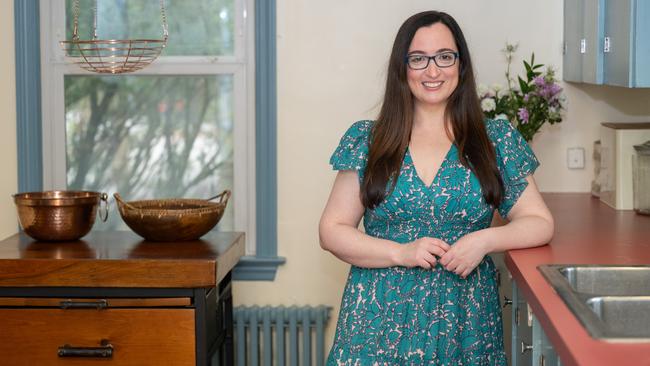
Dieting. It’s just the worst, isn’t it? The miserly scrape of butter across a single slice of toast. Squirting detergent over what remains of the Tim Tams before putting them in the bin. Looking down at the scales, then up at the ceiling in despair, because you’ve somehow managed to stack another kilo on. Is there anything more depressing?
Yes, there is. Feeling fat, in a world where being slim is celebrated. Let’s be frank, fatphobia – the idea that weight is gross, and the weighty unattractive – is why the diet industry is worth what it’s worth.
Into this cultural space have come roaring new weight-loss drugs. Ozempic, Wegovy, Mounjaro – they’re all pretty much the same, in that they contain a synthetic hormone that makes you feel ambivalent, or else queasy, about eating.
Thus, you drop kilos. It’s early days, but they do seem to work for most people. There are side effects (nausea, and fatigue) but the drugs are also considered quite safe. No wonder there’s a stampede on. But should women – and it is mainly women – be taking them?
Into this space steps Kate Manne. She is a Melbourne-born feminist philosopher (she’s also the daughter of public intellectual Robert Manne and his wife, writer Anne Manne).
Her book, Unshrinking: How to Fight Fatphobia, came out earlier this year. She is due to speak about fatphobia and misogyny at this year’s Sydney Writers’ Festival in May. Her interest is, in part, academic (she’s an associate professor of philosophy at Cornell in New York) but it’s also personal: Manne, 41, has been crippled by shame about her weight for most of her life.
“Since my early twenties, I have been on every fad diet. I have tried every weight-loss pill,” she says over a Zoom call from New York.
“When I moved from Melbourne to Boston, for graduate school, I packed my scales. I can tell you precisely what I weighed on my wedding day, and the day I gave birth to my daughter.”
Promoting earlier books, she would “only ever appear on camera via Skype so I could control the angle”, she writes in Unshrinking.
“I would agree to give interviews only when they promised to use one of my shots, rather than sending their own photographer.
“When I gave talks, I asked the audience members not to take any photos. When people posted them on social media, I begged them to take them down.” She hated her size, and like many people she wondered why there couldn’t be some kind of “magic potion” to shrink her body down.
Well, if you believe the “Oh, Oh, Oh, Ozempic” ads (only in the US, since pharmaceutical advertising is banned in Australia), there is!
Ten million people are currently taking Ozempic. You can see the results all over Hollywood, truly now a Barbie world, and perhaps in your own circle of friends. Manne has a message for those who haven’t yet plunged in, but before we get to that message, let’s address what she refers to as “the elephant in the room”.
She is not, as we speak, very fat – though she still identifies as a “small fat” person.
“Before wrestling with my internalised fatphobia, I lost nearly 30 kilograms, basically by starving myself,” she says. “I was at my heaviest when my last book came out, and I just had this sense that life would be so much easier if I lost weight.
“My blood pressure was great. I was active and felt fine, physically. There wasn’t really a reason for me to lose weight, except for the feeling that I should.
“I don’t see my weight loss as a success story; it was really a bit sad. I certainly wasn’t living up to my own principles.
“But I think that’s one of the reasons I wanted to write Unshrinking – so many of us find it hard to break up with diet culture. And standing up to fatphobia is about to become harder than ever.”
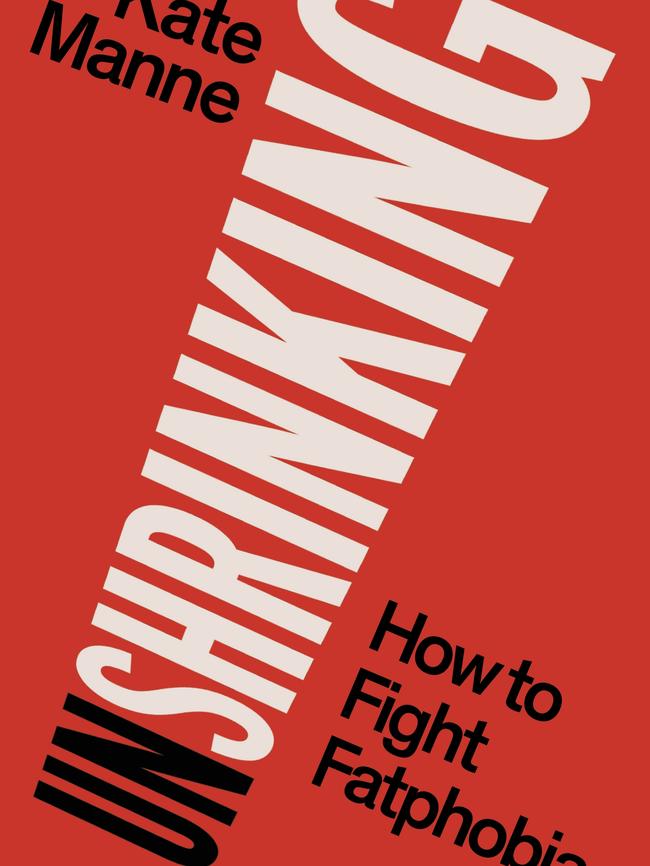
Nothing tastes as good as skinny feels. KateMoss probably didn’t write that, but she did say it, in an interview she now claims to regret.
You can never be too rich, or too thin. The late Duchess of Windsor (formerly known as Wallis Simpson) had those words embroidered onto a throw cushion in her Paris home.
Where does the obsession with being thin come from? Well, gluttony has for at least 5000 years been a sin, probably because food in ancient times was scarce and had to be rationed. Yet fatphobia plagues us still, in the lands of plenty. Manne says her own self-loathing didn’t come from her parents, who “never saw me, whatever my weight, as any less bright or industrious … They celebrated my intelligence along with my appetite”.
She remembers being bullied at school for being chubby – she was voted the person “most likely to have to pay for sex” – but she believes she internalised the fatphobia not only of the schoolyard but of the Western world.
“I see fatphobia as a serious and underestimated form of structural oppression, which intersects with racism and misogyny,” she says.
It’s also a form of shaming, and there have always been efforts to shame women about their bodies. The focus was once on sexual activity (“she’s a bit loose”; “make sure you keep yourself nice”, etc). When that fell away, attention turned to body type.
Why are you so fat? Can’t you control yourself? The answer for most obese people is no: some human beings gain weight for reasons we don’t really understand. Diet has something to do with it, but so do genetics, hormones, the chemicals added to junk food to make you want more of it, the growth hormones in even “fresh food”, the fact that we’re all moving less than we used to, and the culture in which we live.
Having gained weight, most people aren’t able to lose it, at least not in the long-term.
A woman’s metabolism will often slow to a crawl after she’s been on a diet. The moment she starts to eat, the weight will come back.
“Yet fat people are still seen as lacking moral fibre, or willpower or discipline,” says Manne. “Society sees fat people as unattractive, even disgusting.”
In her book, Manne details the ways in which fat people suffer. They earn less. They don’t get promoted as often. They are discriminated against in education and health care. They struggle to find pretty clothes. Plane travel is “particularly traumatic, with some passengers being positively vicious about being seated next to a fat person”.
She also tackles “thin privilege” – where the naturally slim get to lord it over everyone else.
“People cleave to thin privilege, for the social and sexual status that comes with it,” she says. “You can end up wealthier, and more admired. That’s despite the evidence that many people who are overweight on the [largely discredited] BMI scales are no less healthy than thinner people,” she says.
“We are scorned for not taking care of our health, but health is not really on people’s minds when they raise the issue. You are not at risk of premature death if you’re overweight or even moderately obese – at least not from weight.
“We don’t see increased mortality kicking in until very high weights. And, when it comes down to it, most of the people who are taking the new drugs in order to lose weight just aren’t in that category. They are taking them because they understandably fear the assumption that in carrying extra weight, they are gross and lazy. And they want a higher social and sexual status. Just as I once did.”
By chance, Manne is speaking just a few weeks after Oprah Winfrey, whose weight has long been the subject of fascination in America, fronted an hour-long TV special on the new weight loss drugs.
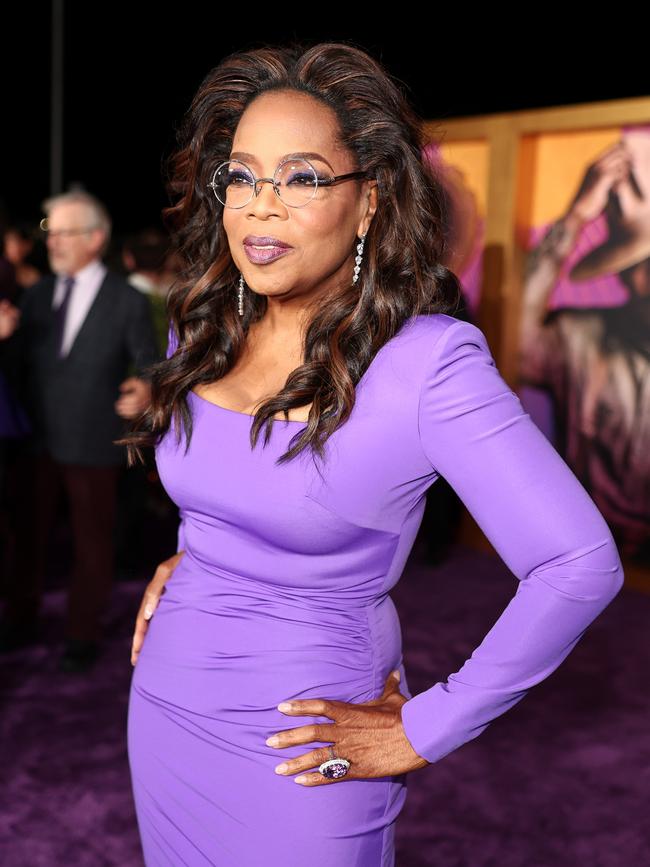
It was called Shame, Blame and the Weight Loss Revolution but critics said it was like an ad for Ozempic. Oprah hasn’t named the drug she took, but said she was “done” with being shamed for needing pharmaceutical assistance to lose weight. She said the medication gave her “an off switch” and quelled the “food noise” that had her lusting after a second, third and fourth helping even when she’d eaten plenty.
Now, it’s at this point in the article where you’d mount the arguments against these drugs. But let’s play devil’s advocate. What if Big Pharma is the good guy here? What if they really have invented a drug that enables women to quickly shed five kilograms? What if these drugs turn out to be potentially good for you? (Recent studies suggest they reduce the incidence of heart failure in obese people, and may be helpful for a range of health conditions.)
Manne insists she will “never tell anyone not to take these drugs”, not even for aesthetic reasons. “A person’s body is their own, and I believe they can do what they want, provided they are not hurting anyone else,” she says. “But I would ask us all to remember the manufacturers are making a very tidy profit. We don’t know how safe they are.” (It should be noted that people have been taking semaglutide – sold under the brand names Ozempic and Wegovy – for type 2 diabetes for years, although not in such high doses).
“We know that some people experience serious side effects,” she adds. “But more than that, we know that the drug companies are promising something which typically isn’t attainable.
“The reality is that most people will go off these drugs, and when they do, the weight comes back.”
Manne likens the drugs to skin-lightening creams, Botox, and nose-jobs (erasing the evidence of a supposedly Jewish nose, like her own, she says.) “Even if all these interventions were perfectly safe and costless and painless, I would still find them objectionable at a social level of analysis,” she says. “They uphold white supremacist, anti-Semitic, misogynistic, ageist beauty standards. But the deeper and more radical point is: what if we began believing with our whole hearts that bodies come in different shapes and sizes? Wouldn’t that be better?”
Almost certainly… but changing the culture? That’s a seriously long-term project. How much more pleasurable to simply drop a dress size. Also, fatphobia is bound to intensify now that the drugs are here ... so, if Manne regains all the weight she lost a few years back, can she see herself buckling?
She has, of course, asked herself that question. Manne was in the final stages of research for her book when she realised it would be coming out just as Ozempic jumped from being Hollywood’s dirty secret to Mummy’s little helper. She imagined the drug working exactly as advertised, without side effects; she imagined it being offered free of charge to anyone who wanted it, and she realised that, “five or 10 years ago, I would have taken it”.
“When I think of what I’ve been prepared to do to lose weight – starving myself – and the way I’ve felt about myself for being fat, I know I would have taken it. That’s why I definitely don’t blame or want to shame anyone who’s pursuing this. I don’t begrudge people doing what they have to do to survive in a fatphobic society.
“If you want to make your body smaller – or your nose straighter, or your ‘frown lines’ smoother – then I believe you have the right to.
“What I would like to do is distinguish two questions: whether you are entitled to take it, and whether you are obligated.
“You are not obligated to shrink yourself to please others, or society, or even to appease your own internalised sense of what you ought to look like.”
She thinks there might be “something gutsy, admirable” in refusing to take these drugs for weight loss, and instead standing up to the “exploitative, capitalist, gaslighting nightmare that is diet culture”. Passionately, she writes: “I believe that our fatness contributes something … We add something to the world with our size and shape and sheer existence.
“I know I owe it to my daughter to have a healthier relationship with my own body.”
“I don’t want her to grow up seeing her mother try to shrink herself constantly to conform to some arbitrary beauty standard.
“There is something cool about being a holdout and saying ‘No, I’m going to be larger, and I’m proud to represent the kind of person who is often marginalised or bullied’.
“Differences in size and shape have always existed, and will always exist, even with the advent of these drugs.”
She knows that the shaming of women won’t end, even if all of them suddenly got skinny. You still wouldn’t be young enough, or white enough, or rich enough, or whatever.
So, no, she won’t be taking them. In fact, these days, she eats what she feels like eating, when she feels like eating it, a strategy that would almost guarantee weight gain.
“I recently bought my first swimsuit in more than 20 years,” she says. “I took my daughter to the pool. I didn’t wear a cover-up. I didn’t think too much about it.”
She happily posed for the portrait to go with this article. And how was that?
“To my surprise,” she said. “I loved it.”
Kate Manne will give the closing address at the Sydney Writers’ Festival on May 26. Her book, Unshrinking: How To Fight Fatphobia is published by Penguin Books Australia



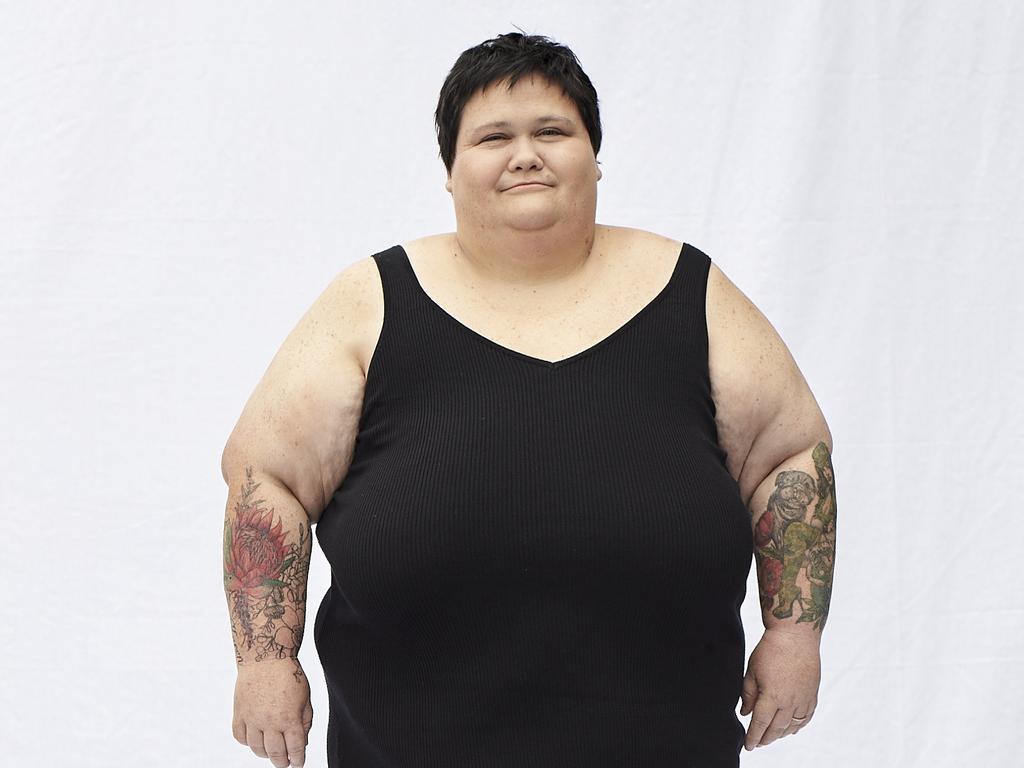
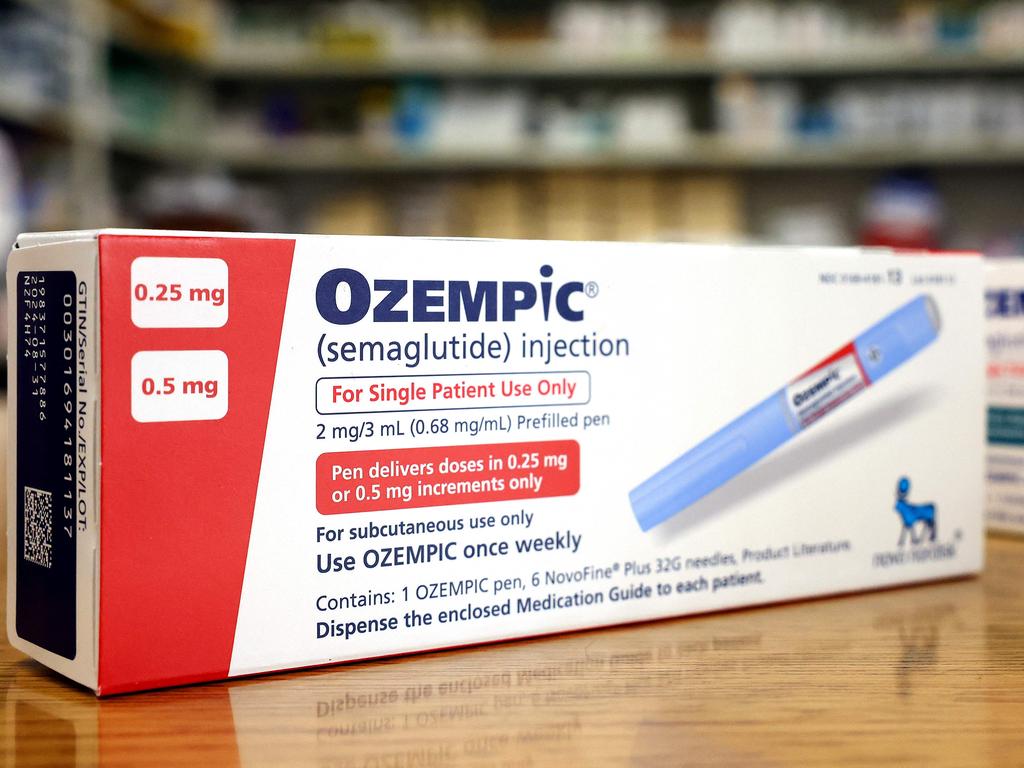
To join the conversation, please log in. Don't have an account? Register
Join the conversation, you are commenting as Logout